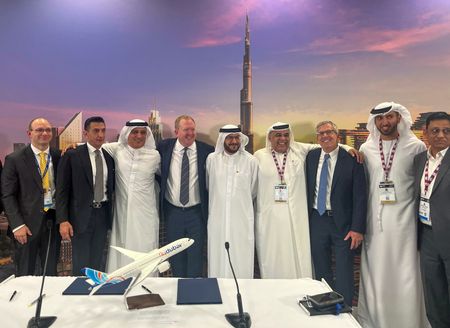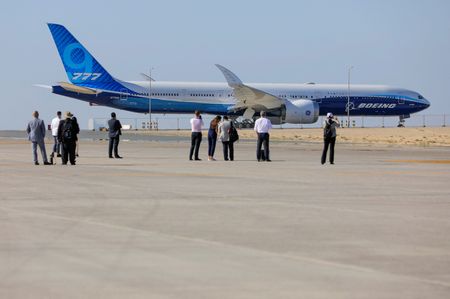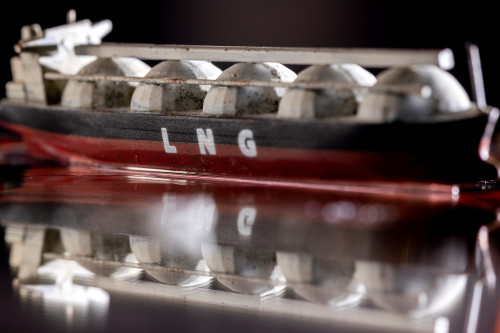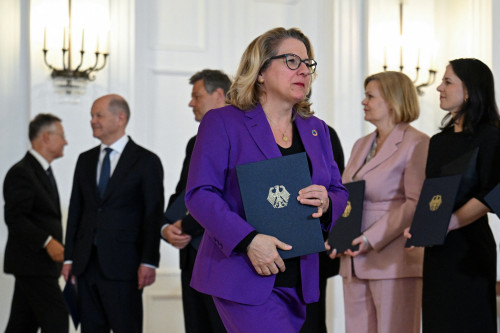By Tim Hepher, Alexander Cornwell and Pesha Magid
DUBAI (Reuters) -Dubai carriers threw down the gauntlet to emerging regional rivals with more than $50 billion of Boeing jet orders on Monday, as competition intensifies to secure dwindling supplies of long-haul jets and anticipate growth in international travel.
Government-owned Emirates and sister airline flyDubai secured 125 Boeing wide-body jets at the opening of the Dubai Airshow, but left Europe’s Airbus waiting for an order for broadly similar A350 jets.
Orders included 55 of the 400-seat Boeing 777-9 and 35 of the smaller 777-8 in a boost for the over-arching programme known as 777X, which has been plagued by five years of delays.
Emirates also took five extra 787 Dreamliners while flyDubai ordered 30 of the same type in its first ever long-haul order.
“Together these orders represent significant investments that reflect Dubai’s commitment to the future of aviation,” said Emirates and flyDubai Chairman Sheikh Ahmed bin Saeed Al Maktoum.
He said Emirates expected to receive the 777X in 2025, which is in line with Boeing’s latest target.
Aviation and tourism industries are crucial to Dubai’s economy, which lacks the oil wealth of many neighbouring states.
In New York, Boeing shares rose 4.4% after the orders, which also included 45 narrow-body 737 MAX for German-Turkish airline SunExpress.
Shares were also lifted by a Bloomberg report that talk this week between U.S. President Joe Biden and Chinese President Xi Jinping could end a prolonged freeze on Chinese 737 purchases.
Medium-haul planes like the 737 MAX and competing Airbus A32neo drive planemaker and supplier profits globally.
But the Gulf is the biggest customer for larger wide-body jets given the favourable geography of its UAE and Qatar hubs.
Industry officials said latest orders raised the stakes as Saudi Arabia looks to establish its own footprint and Turkey and India forge plans to draw connecting traffic away from the Gulf.
“They (Dubai) are saying we are the big elephant in the room (and) demonstrating that they are a big player,” Air Lease Corp Executive Chairman Steven F. Udvar-Hazy said.
Industry officials estimate airlines worldwide are in talks to buy 700-800 new jets, including 200-300 wide-bodies, as they catch up on replacement plans set aside during the pandemic.
But Udvar-Hazy questioned whether there was room for all the capacity being explored simultaneously by the region’s carriers. “They are fighting for the same passengers,” he told Reuters.
Analysts said tight supply chains also remained a concern.
“This is a multiple order and a lot of airplanes. The problem is that manufacturers can’t make enough of them,” said Bernstein analyst Douglas Harned. “Not only are they oversold, but they can’t make what they have already sold.”
Expectations of a 777X deal first surfaced ahead of the show and Bloomberg reported a major order was in the works on Sunday.
Turkish Airlines (THY) burst onto the show’s agenda on Saturday with word from state-run Anadolu news agency that it was in talks to buy up to 355 Airbus jets.
That triggered preparations for a high-profile announcement at the air show on Monday, and then Tuesday, as a Mideast source predicted a “bold move” in the backyard of Gulf rivals.
In an unusual holding statement, Airbus said it had reached agreement “in principle” on a significant THY order. But it added the deal needed to be ratified in the coming days, in what sources saw as a sign it may no longer be announced at the show.
LOWER BOOKINGS
Other significant orders appeared to be in the works without being played out in public in Dubai.
Saudi Arabia’s newest airline Riyadh Air said it is still in talks with planemakers to place an order for narrow-body jets.
Saudia Airlines Group is planning to order about 150 narrow-bodied aircraft for Saudia Airline and low-cost Flyadeal, the group’s vice president for fleet management told Asharq TV.
Saudi Arabia has established Riyadh Air as part of plans to transform the kingdom into a major aviation hub.
With many jets not due to be delivered until 2030 and remain in the skies for two decades, airlines are gambling on long-term demand from future travelers, many of whom have yet to be born.
But the show was overshadowed by the Israel-Hamas war in Gaza that is pushing up demand for weapons and closing airspace.
Ordering six Boeing 787s, Royal Jordanian’s chief executive said the airline was seeing a reduction in traffic and having to operate longer routes as a result of the neighbouring war.
“There’s enough statistical evidence, at least in the short term, to show that there’s been a substantial drop in tickets sales into the region,” said Daniel Silke, director of Cape Town-based Political Futures Consultancy.
Analysts have said the war in Gaza is likely to reinforce demand for weapons on top of a surge in the past 18 months as the United States and its allies rearm Ukraine against Russia.
However, few major arms deals were expected at the show where stands of Israeli arms firms Israel Aerospace Industries (IAI) and Rafael Advanced Defense Systems remained empty.
(Reporting by Tim Hepher, Alexander Cornwell, Pesha Magid, Valerie Insinna; editing by Hugh Lawson, Lisa Shumaker, Shri Navaratnam and Sharon Singleton)









